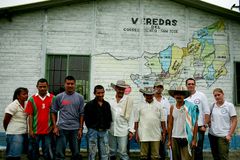The Peace Community of San José de Apartadó has been nominated for the 2011 Sakharov Prize for Freedom of Thought, for their “resilience and dedication to the high values of peace and justice.” This nomination is a fundamental show of support for the Peace Community and for so many other communities in Colombia, which engage in the non-violent struggle to preserve their rights in a context of conflict.
The Peace Community lives in the middle of a conflict zone and any demonstration of international support legitimises its model of peaceful resistance and acts as a protective force against the multiple threats and attacks of which it is victim. PBI has accompanied the Peace Community since 1999 in this environment of armed conflict. In this time, the Community has advanced in its efforts to try to preserve the safety of its members in an extremely hostile context, to claim its right to truth and justice, to fight against impunity, and to create models of sustainable rural development in search of social justice.
In this context, on 9 October 2000, the Inter-American Court of Human Rights granted provisional measures, ordering the Colombian State to take urgent measures to protect the life and safety of the members of the Peace Community of San José de Apartadó. In spite of this, since the creation of the Peace Community in 1997, this peaceful struggle has led to the violent death of nearly 200 members of the Community. 8 of these members, including a leader of the Community together with 2 children and a baby, were killed in a massacre carried out in February 2005. The overwhelming majority of the crimes committed against the Community have remained in impunity.
Apart from threats and attacks, the Peace Community and other projects of peaceful resistance such as humanitarian zones and small farmer (campesino) reserve zones, have been slandered as collaborators or sympathisers of armed actors. Public defamatory statements, whether they come from civil servants, politicians or public figures, are made with the objective of restricting the space for alternative models proposed by the rural campesino population in Colombia and delegitimising their aims. Even more worrying is the effect of these declarations; in direct opposition to the aims of the civilian and campesino population, they serve to situate it as an actor within the conflict and so expose its members to all kinds of threats, judicial harassment and attack. Over the years, PBI has alerted regarding this type of defamation of the Peace Community and its possible consequences.

